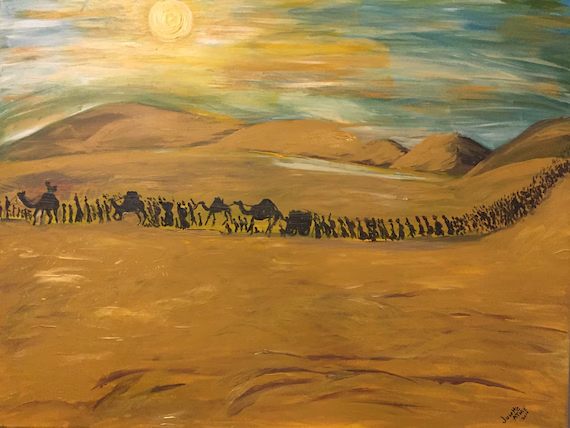Adam and Eve
God made a beautiful garden for Adam and Eve, named the Garden of Eden. He filled it with every kind of flower. and with trees that had fruit which was good to eat.
In the middle of the garden was the Tree of Knowledge of Good and Evil. He told Adam and Eve to live in the garden and to look after it.
He said. 'You may eat fruit from any of the trees, except fruit from the Tree of Knowledge. If you eat that. you will die.
Adam and Eve lived very happily in the garden. There were sparkling rivers of water, and all kinds of birds and animals that God had made.
Adam gave them all names and was friends with every one. Sometimes, on warm summer evenings. God walked in the garden with Adam and Eve and talked to them.
One sleepy afternoon, when Eve was alone, a snake slithered up to her. Did God say you could eat any of the fruit in the garden? it whispered in her ear.
Yes, replied Eve, 'we may eat everything, except the fruit on the Tree of Knowledge. If we touch or eat that, we'll die.
You won't die, whispered the snake. God knows that if you eat the fruit, you'll be wise like gods and you'll have knowledge of Good and Evil.
Then the snake slithered away and Eve thought about what it had said. At last, she walked to the Tree of Knowledge in the middle of the garden.
The fruit looked delicious, and Eve thought she would like to be wise like a god. Quickly she picked one of the fruits and took a bite of it.
When Adam came to find her, Eve was still standing by the Tree, and she gave him the rest of the fruit. After he had eaten it. Adam and Eve looked at each other and saw, for the first time, that they were naked.
They rushed away, and sewed leaves together to make clothes. When they had dressed in them, they could look at each other again.
That evening. God walked in the garden, but He could not see Adam anywhere. 'Where are you. Adam? he called.
I'm here, I'm hiding because I know now that I'm naked, answered Adam.
How do you know?
Have you eaten the fruit from the Tree of Knowledge that I told you not to touch? asked God. 'Eve gave it to me', replied Adam.
Eve, why did you disobey Me?" asked God.
The snake told me we wouldn't die if we ate the fruit, but would become wise, said Eve. 'Because you have disobeyed Me, you must leave My garden. You will have to work hard to grow food.
The ground will be rough and stony. Thorns and thistles will hurt your feet. And when you grow old. you will die, said God.
'If I allowed you to stay, you could eat the fruit of the Tree of Life, and then you'd live forever. Go now.
Then God drove Adam and Eve out of the Garden. Dressed in animal skins, they set out. very miserably, to begin their new, hard life.
God sent an angel with a flaming sword to guard the Tree of Life and angels to guard the Garden of Eden so that no one could ever go into it again.










Comments
Post a Comment